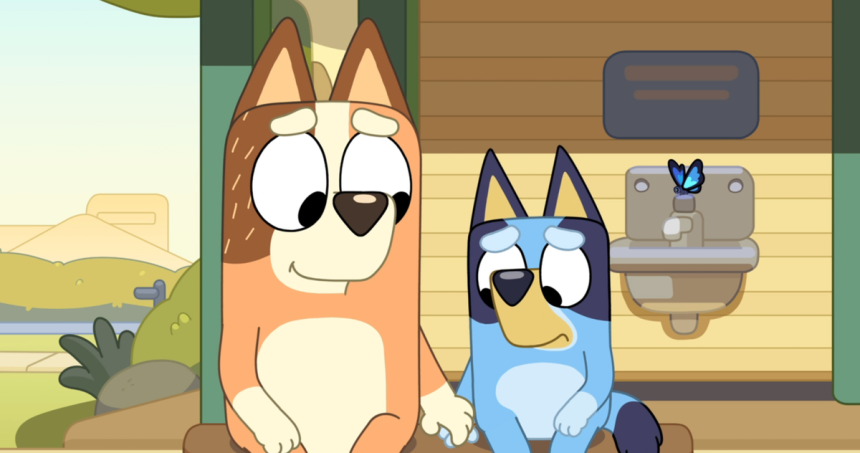Three years ago while reporting a piece about the children’s TV masterpiece Bluey, I asked creator Joe Brumm what he envisioned for the future of the series. The question was already foremost in his mind, he said. He knew that as the children who play Bluey and Bingo got older, the characters’ speech patterns and diction would change. “Do you re-voice the kids?” he asked himself. “You’re not going to find the same voice. It’s going to sound different. You’re not going to fool anyone. Your other option is, do you age up the show with the kids? Set it five years in the future, maybe Mum and Dad have an accident — twins?” Or maybe Bluey and Bingo’s cousins Muffin and Socks could become more central figures … but then, Brumm pointed out, “it’s like, Why are these bloody cousins around all the time? Is there an even wilder solution out there?”
Brumm was not sure what to do in 2021, but watching Bluey’s new special episode, “The Sign,” it seems he’s found an answer. What that answer is, precisely, is still unclear. But “The Sign,” while being a typically lovely, poignant episode of Bluey, only works best if it marks a pivot for the series. If “The Sign” is just a lark — a big, exciting, quadruple-length wedding episode that nevertheless allows the show to continue as it has been — its oddly unrealistic ending is disappointing to the point of frustration, a departure from Bluey’s usual ease in navigating complex emotions. But as an ending, or as a way to transition the series into a new phase, “The Sign” is like so much of Bluey: perfect and devastating.
In the episode, the Heeler family has decided to move away from their home in Brisbane, Australia, to a new unnamed city where dad Bandit got a better-paying job. Bluey is distraught. She seeks comfort from her teacher, Calypso, and tries to stop the house from being sold by removing the “For Sale” sign in the front yard. As the Heelers prepare to move, they’re also getting ready for the wedding of Bandit’s brother, Rad, to Frisky, a longtime friend of mom Chili. Much of “The Sign” is devoted to Chili attempting to find and soothe Frisky, who’s also been blindsided by the news that Rad wants the couple to move away after the wedding, while dealing with her own reticence about leaving Brisbane. In the end, Rad and Frisky announce at their wedding that they’ll stay local, and at the very last moment, as the Heeler family gets ready to drive away from their beloved home, Bandit changes his mind and decides that they, too, will stay where they are.
This is electrifying, ecstatic news for Bluey, Bingo, and Chili. It is also a bizarre choice for a children’s show that has, until this point, prioritized empathy and acceptance toward normal life events that cause real anxiety and turmoil for young kids. Bluey has episodes about sharing, friendship, and the importance of nap time, but also episodes about death, serious childhood illness, premature birth, aging grandparents, infertility, and how to cope with more minor childhood stressors like throwing away old artwork, learning to sleep in your own bed, and not always winning. “The Sign” raises the concept of financial burden, something the show has rarely touched on in the past, then allows Bandit and Chili to opt out of choosing “a better life” for Bluey and Bingo without dealing with the weight or consequences of that decision. It undermines its own early message, as Calypso tells a bereft Bluey that sometimes endings are happy and sad at the same time. Most unusually, it emphasizes a purely child-level style of wish fulfillment without any real attention to the show’s characteristic double vision, which blends parental perspective with a child’s point of view. After more than 150 episodes of Bluey and Bingo gently confronting many common and sometimes painful situations, the end of “The Sign” is a fairy tale that also feels like a cop-out.
Except, in a world where “The Sign” is a grand closing gesture, this ending looks very different. If it marks an ending for the series, it makes perfect sense that Bluey would dramatize the anxiety of moving on while also allowing the Heeler family to stay exactly where they are, safely in their home forever. “The Sign” is also packed with callbacks and answers to many beloved Bluey moments: It caps off an emotional thread with the girls’ aunt Brandy; introduces its very first gay couple; and includes references to Chattermax, “Let’s play Army!,” and Bluey’s floating green balloon.
When I spoke with Brumm in 2021, he was clear that he was uninterested in continuing Bluey beyond the point when the series felt creatively satisfying. “I really love this show, and I love creating things,” he said. “The thought of making something that was worse than the previous season, or that my heart’s not in — to spend a year doing that and to work as hard as you have to work to do the show — that’s a hard one for me.” If the future of the show were not working for him, Brumm told me, it might be time for him to do something else. “Maybe there’s a way through it, and I’m sure there is. But rather than pushing forward, it’s got to feel right creatively.”
“But there’ll be a dollar value put to that,” Brumm added, and the probable shape of that dollar value has skyrocketed since our conversation. Today, Bluey is regularly the most-viewed streaming series in the world, and the amount of money Disney must be willing to pay for more is almost unfathomable. So it may be that “The Sign” is instead a meaningful transition, a way to create a break from Bluey’s current status quo — with or without an additional feature-length film, as the producers have hinted — which would allow it to return with new main characters that could keep the show with a preschool and early-elementary-age viewership. It could also take the form of a time jump, or a shift to Muffin and Socks, or some other new story in a Bluey world setting.
Whatever shape the future of Bluey might take, it’s unlikely “The Sign” will be the show’s final word. Producer Sam Moor told the BBC that more Bluey is coming after “The Sign,” and various fan platforms are speculating there’ll be at least one additional season-three episode, which would bring this season up to the show’s typical 50-episode run count. What’s certain, with or without “The Sign,” is that Bluey has been the definitive work of this generation of children’s television. The fact that it has also become a global blockbuster is one of those rare but well-deserved instances when a truly excellent story has been accompanied by giant monetary success. We can only hope that same enormous success will allow Bluey to continue, or end, on its own terms.
More ‘Bluey’











